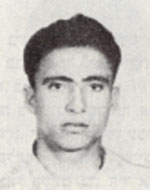Jacob, son of Sa’ada and Shlomo, was born in 1942 in the Atlas Mountains of Morocco, and the family moved from the Atlas Mountains, where Jacob was a young child. The father traded in cloth and used to wander on his donkey from town to town to sell his wares, and the mother took care of the growing family and also sewed clothes for the Arabs in the local bazaar. After studying for a while in a Jewish evening school, he was sent to Mackenzie to study at the yeshiva and after he studied Torah for two years, he returned to his parents’ home to take his share of the burden of supporting the household. In 1955 Morocco was liberated from French rule and the Jews began to suffer persecution. The family moved to Casablanca, where the father decided to immigrate to Israel. Yakov was thirteen, dealt with everything related to family aliyah, took care of all the needs of his brothers and sisters, and with the few remaining belongings, the family immigrated to in December 1956. The father was soon convinced that Ashdod would become an important urban center and the family settled in the city that was being built. Jacob also worked to help the family agriculture, his salary was poor and he went to work in the cotton fields of Moshav Nir-Galim, where he also learned to drive a tractor. The difficult years of settling in Israel prevented Jacob from continuing his regular studies, but thanks to the warm traditional education he received at home, his natural wisdom of life, kindness and integrity, he became a beloved brother, a beloved son and a loyal friend. Yaakov was drafted into the Israel Defense Forces in early February 1962 and assigned to the Engineering Corps, where he served in a combat engineering unit as a truck driver, and his service was flawless, and he was very careful and responsible and his commanders took pride in him. At the end of July 1964, Yaakov was released from regular service and returned to Ashdod. He received a firefighter course and was hired as a firefighter at the port of Ashdod. He fought in the battles of the Six-Day War and his two sons, who were born afterward,
were named after friends who fell in the war – Yigal and Eyal. it did not work out with his wife and he divorced her, but he struggled and succeeded in leaving his two sons with him. He was a role model father and the children adored and loved him. meanwhile he kept supporting his parents, helping his brothers and sisters and encouraging them. With a great deal of effort, he managed to overcome his crisis and he married a second wife, and she became a loving and caring mother to his children. When the Yom Kippur War broke out, Yaakov was sent with his unit to the front in Sinai. In a letter he sent home on October 8, 1973, he wrote, among other things: “You have nothing to worry about, the IDF cares for all its soldiers wherever they are. We are now called ‘the sons of the IDF’. ” The next day, on the 9th of Tishrei 5734 (October 9, 1973), Jacob fell near the Rafidim junction. He was brought to eternal rest in the Ashdod cemetery. He left behind a wife and two sons, parents, two brothers and six sisters. After his fall, he was promoted to sergeant. In a letter of condolences to the bereaved family, his direct commander wrote: “Ya’akov fell in the course of his duty on the 13th of Tishrei 5734, at the Sinai arena. As a new commander of this unit, I did not have the right to command your son Yaakov during the war, but I knew him well from the past when I was his commander. On my behalf and on behalf of officers, commanders and soldiers of the unit, allow me to participate in your sorrow. I hope that his sons, Eyal and Yigal, will proudly bear the name of their father, who fell to the defense of the State of Israel. “The unit commander: … “Your son Ya’akov, of blessed memory, served in our unit in a responsible position and did not spare any effort to fulfill his role in the best possible way.
